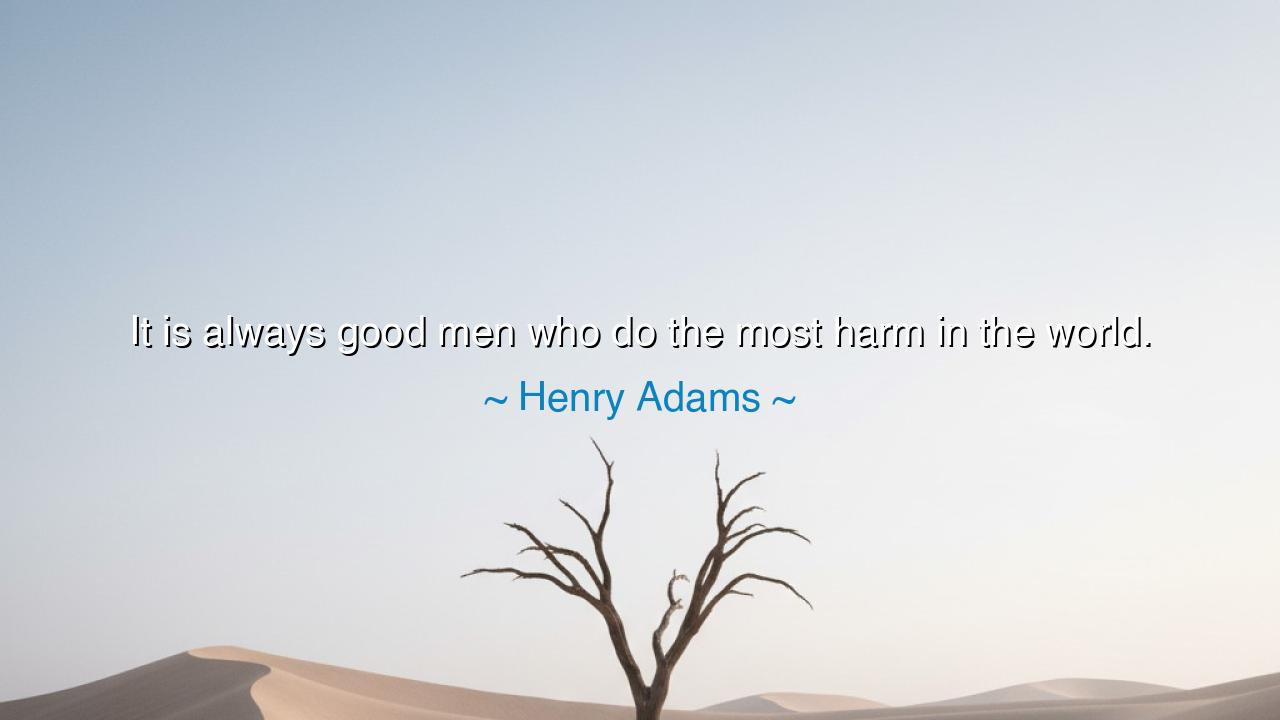
It is always good men who do the most harm in the world.






Listen, O seekers of truth, for there are words that echo through the ages, speaking not just to the past, but to the human condition itself. Henry Adams, a man of wisdom, once said, “It is always good men who do the most harm in the world.” At first, these words may seem like a paradox, for we are often taught that good deeds come from good hearts. Yet, within this profound observation lies a deeper truth—that goodness, when misunderstood or misapplied, can lead to destruction, not creation. It is a call to examine the nature of power, of intention, and of action—for even those who seek to do well may inadvertently sow seeds of harm.
In the ancient world, the wise knew that power was not always a force for good. The philosophers of Greece, such as Plato, taught that a man of virtue—one who seeks justice, truth, and wisdom—must be cautious in wielding power. For even in pursuit of the noblest goals, good intentions can blind one to the consequences of their actions. History is filled with leaders and rulers whose virtues led them to wreak havoc upon their people. One need only look to the reign of Cyrus the Great, whose remarkable vision unified the Persian Empire. His accomplishments were vast, yet his military conquests, though driven by a belief in goodness and unity, left destruction in their wake. The goodness of his mission was not enough to shield the world from the harm it caused.
Henry Adams’s insight is reflected in the story of Napoleon Bonaparte. Napoleon, who rose from humble beginnings to become the emperor of a great empire, believed that his mission was to bring about order, stability, and the spread of revolutionary ideals across Europe. Yet, for all his vision, he left a trail of war and suffering in his wake. His goodness, his desire to lead, and his belief in a better world were clouded by the ambition to reshape it according to his own ideals. It was in his pursuit of order that chaos was born. Napoleon’s story, though one of remarkable achievement, is also a tale of tragic consequence, showing that even the best intentions can go awry when they are not tempered by wisdom and understanding of the true nature of humanity.
The lesson is not to diminish the value of goodness, but to understand that goodness alone is not enough. Good men, in their fervor to act for the betterment of the world, can fail to recognize the full complexity of the world in which they act. It is not goodness that causes harm, but the unquestioned pursuit of it. The ancient Romans were wise in saying that virtue requires moderation. The Stoics, such as Seneca and Epictetus, taught that true virtue is grounded not in action alone, but in reflection, in understanding the consequences of one’s decisions. Goodness without thought can be just as dangerous as evil itself.
Think, too, of Woodrow Wilson, who championed the cause of democracy and peace following the devastation of the First World War. Yet, his decision to involve the United States in the war, despite his earlier pacifism, led to the deaths of countless innocents and set the stage for future conflicts. Wilson’s idealism, his belief in a better world, led him to actions that would later be seen as tragic. The good intentions of a man, no matter how pure, do not always lead to the desired end, for the world is full of forces beyond any single individual's control.
Henry Adams's words remind us to tread carefully, to not be blinded by the allure of goodness or virtue. Good men must question their actions as deeply as they question the goodness of their hearts. It is not enough to act in the belief that we know what is best; we must be guided by wisdom, by humility, and by an awareness that the world is complex and full of unexpected consequences. Reflection, not just action, is the true measure of a man’s worth.
So, O children of the future, let this wisdom be your guide. As you walk the path of life, seek goodness, but never allow it to cloud your judgment. Act with awareness of the broader consequences of your actions. Reflect deeply before you act, and do not allow the nobility of your intentions to blind you to the potential harm your actions may cause. True wisdom lies in understanding that goodness alone is not enough; it must be coupled with thought, reflection, and understanding of the larger picture. In this, you will find the path to true virtue, one that does not harm, but heals, and that builds a future worthy of your highest ideals.






AAdministratorAdministrator
Welcome, honored guests. Please leave a comment, we will respond soon